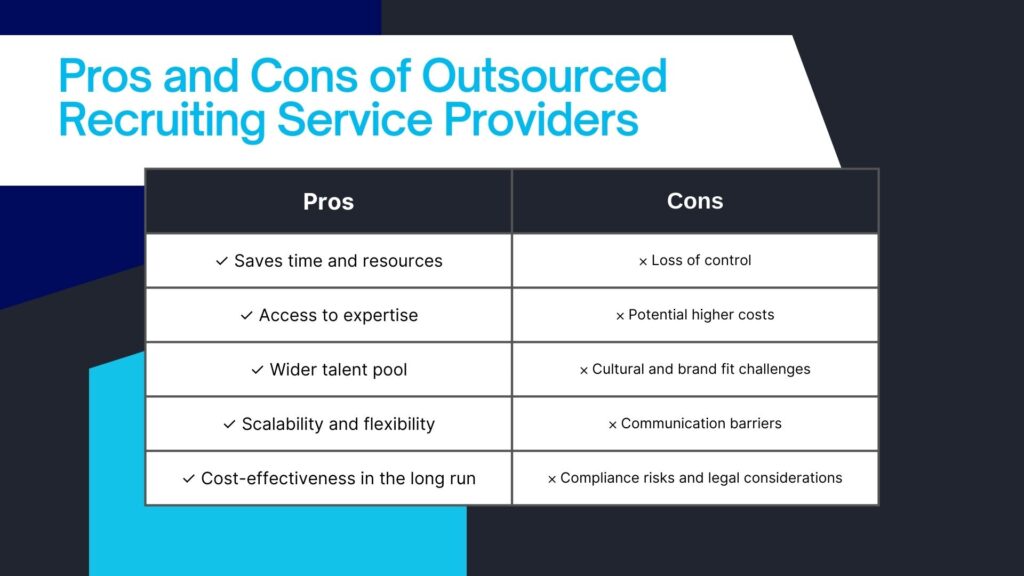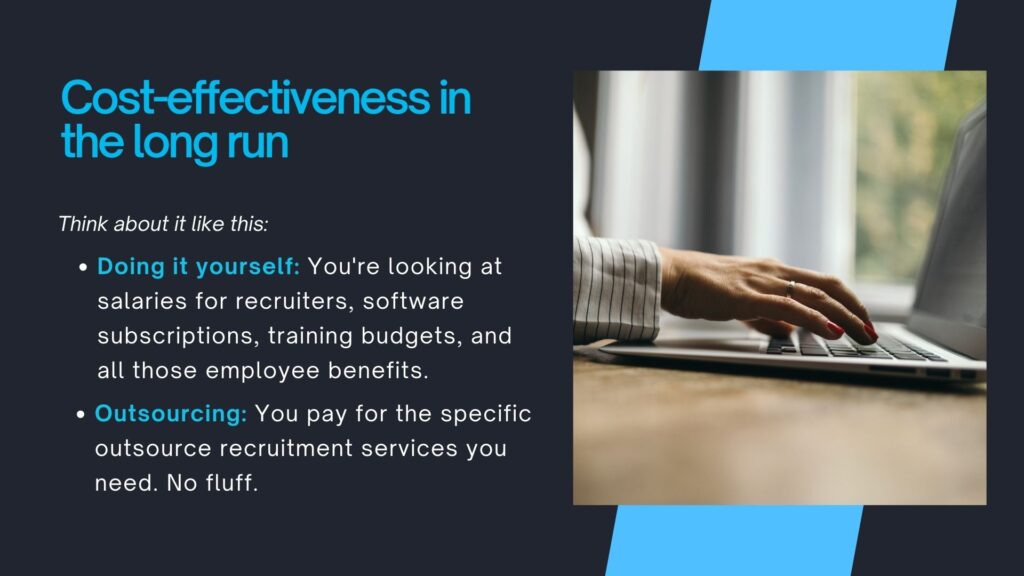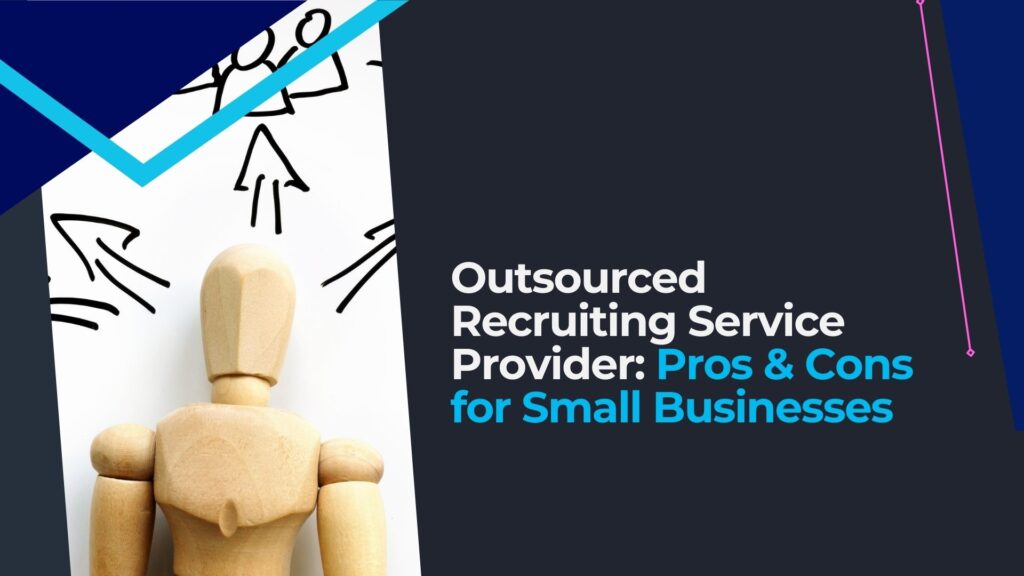Six out of ten HR professionals in the UK, according to the Society for Human Resource Management (SHRM), are banging their heads against the wall over clunky hiring. Nearly 60% are saying, “We’re losing good people because this process is a mess.”
Now, shrink that down to a small business. Think of tight budgets, not enough hours in the day, and often, zero in-house HR expertise. Finding the right talent feels like climbing a mountain.
So, more and more companies are looking to outsource their recruitment. It makes sense; you get access to specialists, a bigger pool of potential hires, and maybe even save some cash. But, is it a one-size-fits-all solution? It can speed things up and make the whole hiring process smoother.
But hold on…there’s a catch. Handing over the reins means losing some control. And those savings? If you don’t play your cards right, those costs could balloon in the long run. The question isn’t just “Can we afford it?” but “Can we afford to get it wrong?”
Pros and Cons of Outsourced Recruiting Service Providers
By 2025, you’ll see a big chunk of businesses handing off key tasks, because they realize they need specialized help to keep up with how fast the job market is changing. These outsourced recruiters? They’re bringing industry knowledge, speeding up the hiring process, and helping businesses figure out their hiring strategy in the bigger picture.
Now, outsourcing is not for everyone. Here’s a quick look at the good and the bad:

Outsourcing recruitment is a big decision, and honestly, whether it’s a smart move really depends on your company’s unique situation. We’re going to dive into the nitty-gritty here, laying out the pros and cons. This is a straight-talking guide to help you figure out if this path makes sense for your business, based on what you actually need.
Advantages of Outsourced Recruiting Service Provider
Numbers show that 77% of companies worldwide are grappling with talent shortages. For small businesses, that lack of manpower in HR can sting. They often don’t have the bandwidth to run a full-fledged recruitment operation.
So, why are so many turning to RPO? It’s about getting more bang for your buck. It’s about leveling the playing field and giving smaller companies the same access to top talent that bigger corporations enjoy. Let’s talk about the pros in detail:
1. Saves time and resources
We’re taking an average of 36 days to hire a talent and those recruitment costs can easily top $4,000 per hire. If you’re a small business, with a tiny HR team (or maybe no HR team at all), that’s a massive drain on your resources.
Now, here’s where outsource recruitment comes in. It’s like hitting the fast-forward button on hiring.
- Faster time-to-hire: These RPO companies have techs like automated sourcing, pre-screening, and ready-made networks of candidates. They know how to cut through the noise and get you the right people.
- Administrative relief: The job postings, the background checks, the endless admin? Poof! Gone. They handle it all, freeing up your team to focus on everything else.
For instance, a small business in the UK was drowning in hiring delays. They teamed up with All In Outsourcing, and boom – they slashed their hiring time by a solid 50%. Suddenly, the leadership team could get back to growing the business, instead of getting bogged down in recruitment headaches.
2. Access to expertise
Many small businesses might not have someone on staff who knows the ins and outs of hiring – the latest trends, all those compliance rules, and the specific needs of their industry. This lack of expertise can lead to some pretty expensive hiring blunders.
That’s where outsource recruitment can be a real lifesaver. These RPO companies live and breathe recruitment, especially in specialized areas.
Plus, they bring valuable insights to the table. They’ve got the market intel, and they know what salaries are competitive, so you can make sure you’re offering the right package to attract top talent.
3. Wider talent pool
RPO firms got their fingers in all sorts of talent pools, all over the world. They’re not just looking at the people actively job-hunting; they’re reaching out to folks who might be a perfect fit, even if they’re not actively looking.
And they’re not just throwing darts at a board, either. They’re using some pretty smart tools, like AI to sift through resumes and data to match people up with the right jobs.
4. Scalability and flexibility
You know how it goes – sometimes you need a ton of people, like during a big holiday rush or when a huge project lands. Other times, things are quieter.
Bringing in outside help can make a real difference. RPO companies are built for this. They can turn the hiring tap on or off as needed. Need to quickly add a whole bunch of people for a short period? They’ve got the systems and resources to handle it. Things slow down? They adjust right along with you.
It’s like having an on-demand recruitment team, ready to go whenever you need them, and saving your internal team from getting swamped during those hiring peaks.
5. Cost-effectiveness in the long run
With outsourcing, you’re basically streamlining the process, making it way more efficient, and that translates to lower costs per hire. Plus, by getting it right the first time, you cut down on the expensive cycle of hiring, firing, and rehiring.
Think about it like this:
- Doing it yourself: You’re looking at salaries for recruiters, software subscriptions, training budgets, and all those employee benefits.
- Outsourcing: You pay for the specific outsource recruitment services you need. No fluff.
The bottom line, you’re not carrying the weight of a full-time recruitment department. You’re only paying for what you use—when you use it. Over time, that adds up to serious savings.

Disadvantages of External Hiring Partnerships
Outsourcing recruitment? It’s a tempting idea, for sure, with those potential upsides. But, let’s be real, it’s not all sunshine and rainbows. You’ve got to consider the trade-offs, the stuff that can really trip you up. Here’s some:
1. Loss of control
Here’s the thing with handing off recruitment to someone else: you start to feel like you’re losing the reins. It’s that whole “if you want something done right, do it yourself” feeling. You’re not in the room when they’re interviewing people, you’re not making the gut calls, and that can be unsettling.
In fact, UK outsourcing companies bring worry for many businesses because they feel they lack control. Especially when you’re talking about jobs where you need someone with really specific skills or someone who just gets the company vibe. It’s hard to trust someone else to nail that.
2. Potential higher costs
Sure, outsourcing recruitment can be cheaper, eventually. But here’s the kicker: those “hidden fees” can sting. If you think you’ve got a solid contract, then bam! They’re charging extra for background checks, posting job ads, and even just figuring out if a candidate’s any good. Suddenly, that “bargain” isn’t looking so great.
Think of it this way:
- In-house: You’re paying for your HR team’s salaries, the software they use, blasting out job ads, and all the stuff that goes into getting a new person settled in.
- Outsourcing: You’ve got the service fees, which seem straightforward. But then you’ve got those extra costs for screening, testing, you name it. Plus, you’re locked into a contract, so if things go sideways, you’re still paying.
Basically, you need to be sharp and read the fine print. Otherwise, that “cost-effective” outsourcing can end up costing you more than if you’d just hired someone down the hall.
3. Cultural and brand fit challenges
You need someone who not only has the right skills but also just clicks with everyone else. That’s where things get tricky when you’re relying on outside recruiters.
Here’s the problem: these recruiters, even the good ones, might not really get your company’s vibe. They might not fully grasp your unique culture, the values you hold dear, or the image you’re trying to project. And what happens then? You end up with hires who, while technically qualified, just don’t mesh with the team.
4. Communication barriers
Trying to hire someone overseas sounds great in theory, but then reality hits. Number four on the list of headaches? Communication.
Sending recruitment work to places where they’re hours ahead or behind, or where they just… talk differently, it’s a slowdown. You get delays, people not understanding each other, and everyone’s on a different page about what you want.
To break it down, here’s where the wheels fall off:
- Time zone differences: Think about it, you send a question at 3 PM, and they’re already asleep.
- Language barriers: Even if everyone speaks English, it might not be their English, you know? Nuances get lost, and you might miss a great candidate.
- Misaligned hiring expectations: What you think a “senior” engineer looks like, and what they think, could be miles apart. So you get the wrong candidates.
5. Dependency on a third party
With outsourcing recruitment overseas, you’re putting a lot of eggs in someone else’s basket. And that can shift. Imagine, the company you’re relying on suddenly hikes their prices, changes their rules, or their work just isn’t up to snuff anymore.
Even worse, if you hand over everything recruitment-related, you start losing your ability to hire people directly. That’s like forgetting how to ride a bike. If you ever need to bring recruitment back in-house, you’re going to be scrambling because you’ve lost that know-how. Basically, you’re vulnerable if you don’t keep some of that expertise in-house.
Final Takeaways
But…and there’s always a but in outsourcing recruitment. You’ve got to be aware of the potential downsides.
The real trick is finding the right outsourcing approach for your business. What works for one company might be a disaster for another. It’s all about aligning your outsourcing strategy with your specific goals and what kind of workforce you need.
So, if you’re thinking about diving into outsourcing, don’t rush it. Do your homework. Check out different providers, compare their pricing, and make sure they’re a good fit for your company. You might even want to talk to experts, like All In Outsourcing, to get some personalized advice and find the best hiring strategy for your situation. We want to hear from you so reach out to us today, and let’s plan your outsourcing strategy!
